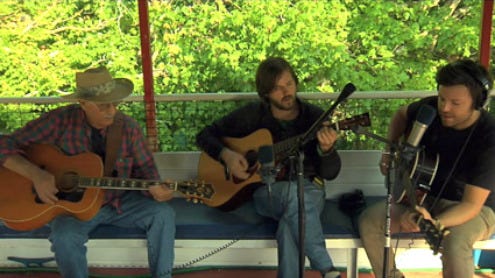Don't Quit Your Daydream

Click here for showtimes for "Don't Quit Your Daydream"
The Good Listeners are, to my ear, a really good band. The fact that duo Clark Stiles and Nathan Khyber haven't made it big-time is another example of the capriciousness of the music biz. Why these two artists, who have long suffered for their music, continue to work dead-end day jobs while talentless teenyboppers rake in millions is beyond me.
"Don't Quit Your Daydream" is the chronicle of their journey across the U.S. in a rented RV, making stops to compose and record songs with collaborators (mostly strangers) in each town.
The documentary, directed by Stiles, starts with an astonishing moment in which the two men are confronted by an unseen woman's voice eviscerating the forthcoming trip as a lame stunt by two aging wannabes grasping for one last shot at music careers. Neither Khyber or Stiles can summon anything more than a stuttering response.
We sense that this is somebody's wife or girlfriend, which adds to the heavy patina of sadness that clings to their joyous exploration of music.
"Don't Quit Your Daydream" is reminiscent of another excellent documentary about an unheralded band: "Anvil! The Story of Anvil." Both films are about rock 'n' roll dreams denied, and yet the dreamers never stopped striving -- even when time and all sense of logic dictated that they should have.
Stiles and Khyber come across as less pathetic than the Anvil boys, if only because they seem to fully appreciate their bleacher-seat status. They do not dream of their music leading to a life of mansions and Bentleys. They'd settle for health insurance.
Stiles says he can accept that it's likely he'll never make a living from music. But he loves it so much, he never wants to stop.
Their partnership is on somewhat shaky ground. In the late 1990s, they were in a band together called Absinthe that briefly was the Hot New Thing, before their label dumped them. Khyber was instrumental in getting Stiles kicked out of the band, for reasons that seem hazy now even to him. Forgiveness was offered and accepted, but there remains a trace of conflict between them.
Their musical expedition starts off well, in a collaboration with a hippy musician who lives in a dome house in the California desert. Things don't go so great at their next stop, where a woman who welds metal sculptures turns out not to be the violinist she was touted. Then a man named Lane drunkenly stumbles into the proceedings, drinking beers two-fisted, and sends the recording session into a tizzy of creativity. Later, he crashes his car and is taken to the hospital.
It's a comment on the nature of making music, where the best plans are waylaid by happenstance. Sometimes tragedy results, but every now and then magic emerges.
The other collaborations result in widely varying degrees of success. They have to convince a Memphis blues guitarist named Daddy Mack to give up a day of fixing cars to jam with them -- eventually having to fork over $400. Their session deflates without any real musical connection, and feels more like a transaction.
They also visit Paul Green's School of Rock -- which was the subject of its own documentary, and seems to have inspired the Jack Black comedy -- where Stiles and Khyber are rejuvenated by youngsters who want real guitars in their hands instead of plastic video game controllers.
There are also stops with a man who uses old computers and video games to produce lyrical sounds, and a Louisiana swamp boat tour guide.
The weakest section involves a jam session with a celebrity, which feels falsely shoehorned into their voyage. Actor Adrian Grenier, who used to room with Stiles, arrives late for his session and then drags the band to the Kentucky Derby so he can make the scene.
This whole section should probably have been edited out of the film, but seeing as Grenier is one of the producers, that doesn't seem likely.
Through small snippets we learn a little more about Khyber and Stiles' personal lives. But mostly they're our avatars in this journey through the unseen reaches of pop music, where untold numbers of people practice and play without any possibility of ever making a living at it.
Most of these people may not have a chance, but they have hope, and maybe that's a better thing. Because if The Good Listeners and those they meet didn't hope of making it, some wonderful music might never have been created.
4.5 Yaps



